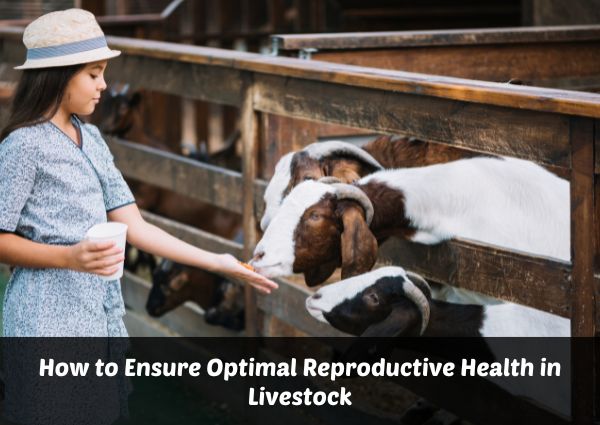Reproductive health is a critical factor in livestock management, directly influencing productivity, profitability, and sustainability of a farm. Whether you are breeding cattle, sheep, pigs, goats, or poultry, ensuring optimal reproductive health is key to maintaining healthy populations and achieving high rates of growth and output. Poor reproductive health can lead to issues such as infertility, lower birth rates, and increased mortality, all of which can negatively affect a farm’s success.
This blog will explore effective ways to ensure optimal reproductive health in livestock, from nutritional management and disease prevention to genetic selection and environmental management.
Proper Nutrition and Diet Management
One of the most crucial factors in ensuring optimal reproductive health in livestock is maintaining proper nutrition. Nutrition affects fertility, gestation, and overall health of both the mother and the offspring. A balanced diet helps prevent reproductive disorders such as delayed estrus, poor conception rates, and low birth weights.
Key Nutrients for Reproductive Health
Proteins: Essential for growth, development, and reproduction.
Vitamins and Minerals: Vitamin A, E, and selenium play a crucial role in fertility, reducing pregnancy complications and promoting healthy fetal development.
Fats: Certain fatty acids improve conception rates and support the growth of embryos.
Energy Sources: Animals need adequate energy to support reproductive processes, including ovulation and lactation.
Ensuring livestock are fed a balanced diet tailored to their specific needs during breeding, pregnancy, and lactation is fundamental to maintaining optimal reproductive health.
Disease Prevention and Veterinary Care
Diseases are a major threat to reproductive health in livestock. Infertility, miscarriages, and poor pregnancy outcomes can all be caused by common reproductive diseases. Disease prevention through proper health management practices is critical in ensuring reproductive success.
Common Reproductive Health Diseases in Livestock:
Brucellosis: A bacterial infection that causes abortions and infertility.
Leptospirosis: A bacterial disease that leads to abortions and weak offspring.
Mastitis: A common issue in dairy animals that affects milk production and can interfere with reproduction.
Vibriosis and Trichomoniasis: Both are sexually transmitted diseases that lead to early pregnancy loss.
To prevent these diseases, follow these steps:
Vaccination Programs: Ensure that livestock are vaccinated against common reproductive diseases.
Regular Health Checkups: Routine veterinary visits to monitor reproductive organs and overall health.
Hygiene and Biosecurity: Maintaining clean facilities and practicing biosecurity measures to limit exposure to disease-causing agents.
Parasite Control: Parasites can cause weakness, which affects fertility and reproductive health. Regular deworming and parasite management help prevent reproductive issues.
Genetic Selection and Breeding Practices
Genetic selection is a powerful tool in improving reproductive health in livestock. Selective breeding ensures that the most fertile, healthy, and productive animals pass on their desirable traits to the next generation.
Tips for Genetic Improvement
Choose Proven Breeders: When selecting sires and dams, prioritize animals with a strong history of fertility, healthy offspring, and high birth rates.
Implement Artificial Insemination (AI): AI allows farmers to use high-quality genetic material from top sires, which can improve herd fertility and reproductive efficiency.
Incorporate Embryo Transfer: In some high-value livestock operations, embryo transfer can enhance reproductive outcomes by transferring embryos from genetically superior females to other females.
Monitor Inbreeding: Avoid excessive inbreeding, which can lead to fertility problems, genetic defects, and low birth rates.
Genetic selection helps farmers improve not only reproductive health but also other important traits such as milk production, growth rate, and disease resistance.
Environmental and Stress Management
Stress is one of the leading causes of reproductive failure in livestock. Stressful environments, such as overcrowded housing, poor handling practices, and harsh weather conditions, can significantly impact the reproductive health of animals. Animals under stress are less likely to conceive and carry pregnancies to term.
Ways to Manage Stress and Ensure a Healthy Environment
Provide Adequate Space: Overcrowded facilities can lead to stress, which in turn affects reproductive performance. Ensure that livestock have enough room to move, eat, and rest.
Optimize Temperature Control: Extreme temperatures can negatively affect reproductive cycles. Providing shelter from heat and cold, as well as access to fresh water, helps maintain healthy reproductive conditions.
Handling and Movement: Gentle handling reduces stress during breeding and pregnancy. Avoid rough handling, as it can lead to miscarriages or injuries.
Minimize Transport Stress: Transportation can be a stressful event for animals, particularly during pregnancy. Transport livestock in well-ventilated, comfortable trailers and avoid long journeys during critical reproductive periods.
By creating a comfortable and stress-free environment, you can significantly improve the reproductive performance of your livestock.
Monitoring Reproductive Cycles and Estrus Detection
Efficient reproductive management depends on the timely detection of estrus (the period when a female is receptive to mating). Missing an estrus cycle can lead to a delay in breeding, reducing the number of offspring produced annually. Regular monitoring of reproductive cycles helps ensure that animals are bred at the right time.
Techniques for Monitoring Reproductive Cycles
Visual Observation: Look for signs of estrus, such as restlessness, mounting behavior, and swelling of the vulva.
Heat Detection Devices: Use heat detectors, such as tail paint, patches, or electronic sensors, to track when females are in heat.
Ultrasound Scanning: Veterinary professionals can use ultrasound to monitor ovarian activity and pregnancy status.
Estrus Synchronization: Hormonal therapies can help groups of animals synchronize their estrus cycles, which guarantees that breeding takes place at the appropriate time.
Efficient heat detection helps maximize reproductive efficiency, leading to higher pregnancy rates and better reproductive outcomes.
Ensuring Postpartum Care
For both the mother and her children, the postpartum period is critical. Postpartum care helps ensure that the mother recovers properly and is ready for the next reproductive cycle, while newborn animals are given the best possible start in life.
Postpartum Care Practices
Proper Nutrition for Lactating Mothers: Ensure that nursing mothers have access to high-quality feed to support lactation and recovery.
Monitor for Postpartum Complications: Keep an eye on the mother for signs of retained placenta, uterine infections, or mastitis, which can hinder future reproductive performance.
Colostrum Management for Newborns: Newborn animals should receive colostrum (the first milk produced by the mother) within the first 24 hours to boost immunity and promote healthy growth.
Good postpartum care promotes the long-term reproductive health of your livestock and ensures the success of future breeding efforts.
Conclusion
Maintaining optimal reproductive health in livestock requires a comprehensive approach that includes proper nutrition, disease prevention, genetic selection, stress management, and effective reproductive monitoring. By focusing on these areas, farmers can increase fertility rates, improve offspring health, and ensure the long-term sustainability of their livestock operations.
At Amino Pharma, we provide a range of nutritional supplements and veterinary solutions designed to support the reproductive health and overall well-being of your animals. With the right care and management practices, you can enhance reproductive performance and ensure that your livestock thrive for generations to come.

